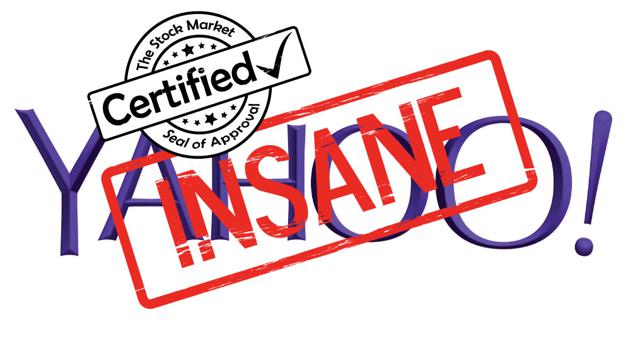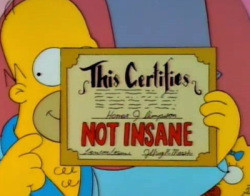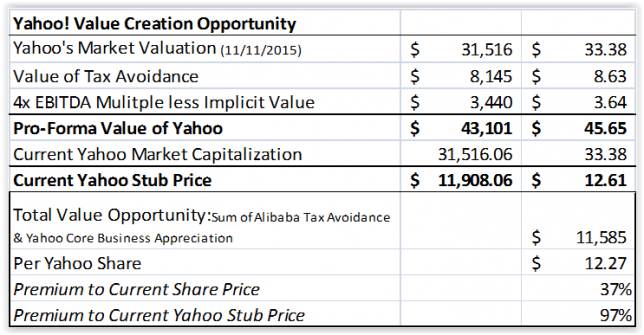“Sometimes I use to wonder if I was nuts.” – Warren Buffett
If the market is efficient, then Yahoo must be completely nuts. That’s the only way to rectify Yahoo’s (NASDAQ:YHOO) current share price. Given where Yahoo trades, the market believes that there is a ZERO PERCENT probability that Yahoo will successfully spinoff its Alibaba (NYSE:BABA) shares into Aabaco Holdings. To put this into context, a successful tax-efficient spinoff of Aabaco is worth upwards of $9 per share. But the market has placed exactly zero probability and therefore zero dollars of value to this outcome. In fact, to hold such a strong assertion, the market must think that Yahoo’s Aabaco hopes are merely hallucinations and nothing more. In other words, Yahoo is certifiably insane.

Such a strong conviction by the market must be supported by equally powerful evidence. If it turns out that the market has mis-weighed the facts, then a profitable opportunity likely exists.
This article will examine the sanity of Yahoo and the resulting investment opportunity. There are three stages to this assessment:
- A Yahoo Sum of Parts Analysis: A sum of parts analysis will reveal how much value the market places on the probability of a tax-efficient spinoff, and the value of Yahoo’s core business.
- Analyzing the Evidence: We will contemplate the evidence required to be 100% certain and then juxtapose that against the evidence which the market has at its disposal to form an opinion.
- Investment Opportunity: Given the article’s findings, we will examine the investment potential of Yahoo and the best way to maximize value.
Sum of Parts Analysis:
Given that Yahoo is primarily composed of actively traded securities and other highly liquid assets, a sum of parts analysis is a highly useful tool for examining Yahoo’s market valuation. By stripping out the after-tax stakes in Alibaba and Yahoo Japan as well as Yahoo’s net debt, we are left with $585 million, or $0.62 per share.
This remainder of $585 million, or $0.62 per share, is the total value that the market has assigned towards two assets:
- Yahoo’s core operating business
- The value of a tax-efficient spinoff of Aabaco
To determine how much of those 62 cents are attributable to the Core business and how much to the tax-efficient spinoff, let’s estimate the value of Yahoo’s core business.
The general consensus among industry analysts is that Yahoo’s core business should trade between 3 to 5 times EBITDA. Using the middle ground of 4x EBITDA, that gives us a value of $3,440 million, or $3.64 per share. At that valuation, we’d have an 83% margin of safety.

If you assume that the entire residual value of $0.62/share is attributable to Yahoo’s core operating business, that means it’s trading at only 0.68x its 2016 EBITDA estimate. To put that into perspective, Verizon recently acquired AOL for 8x EBITDA.
With such a generous margin of safety when looking at Yahoo’s core business, we can be assured that the market is assigning no value to a successful spinoff of Aabaco. Now that we’ve verified that the market thinks that Yahoo’s management, board of directors, and tax lawyers are all insane for going ahead with the spinoff, we can analyze the evidence and issue a second opinion.
Analyzing the Evidence:
As stated earlier, in order to make such a bold assertion about the impossibility of a successful Aabaco spinoff, the market needs to have equally compelling evidence. To assess the market’s opinion let’s run a thought experiment. Let’s imagine what evidence we’d actually need in order to arrive at a zero percent probability and then juxtapose that against the evidence which we’ve actually seen.
There are three major elements which we will examine in this manner. They are an IRS Private Letter Ruling, any IRS Guidance, and the professional consensus. Let’s take a look.
#1: IRS Private Letter Ruling regarding tax-free status of Aabaco spinoff.
Evidence we’d need: The IRS would have issued a Private Letter Ruling denying tax-free status to the Aabaco spinoff.
Evidence we’ve actually seen: The IRS declined to give a Private Letter Ruling on Yahoo’s proposed tax-free spinoff of Alibaba. Although the IRS did not indicate whether it was ruling against the request. As described by Tony Nitti, “No, it’s not dead…It just means that the IRS didn’t have the decency to tell Yahoo whether it’s dead or not. This means if Yahoo wants, it can still move forward with the transaction, but with no assurances that the spinoff will be tax free….It appears they have faith in their tax attorneys, and will move forward with the spin.”
#2: IRS Guidance.
Evidence we’d need: The IRS would have issued new guidance thereby eliminating the possibility for tax-efficient spinoffs.
Evidence we’ve actually seen: The IRS has not issued new guidance to date, but it did formally announce on July 31, 2015 that it was studying potential new administrative guidance with respect to spinoffs.
#3: Professional Consensus:
Evidence we’d need: Tax Lawyers & Analysts would be in consensus that the tax-efficient spinoff will fail.
Evidence we’ve actually seen: Tax Lawyers & Analysts are generally more positive than not that the tax-efficient spinoff will go through successfully. Two such examples:
- FBR said its latest comment on Yahoo assumes that the company will succeed in the push to spinoff the stake in Alibaba Group Holdings Ltd in a tax-efficient manner.
- “I believe the spinoff will proceed as planned and, in the final analysis, will be found to be tax-free,” said Robert Willens, a New York-based tax consultant.
In all three cases, it is impossible to arrive at a conclusion that approaches absolute certainty. Instead the current set of public information requires us to make a series of subjective judgments as to the likelihood of the IRS’s action.
The acid test for insanity is to either be hallucinating (i.e. perceiving something that’s not there) or delusional (i.e. false beliefs). As demonstrated above the IRS has made no definitive actions to close the doors on Yahoo. Meanwhile the general opinion of Yahoo’s legal counsel has a positive outlook towards the spinoff, as do industry analysts and tax lawyers on the whole. While significant uncertainty exists, Yahoo is certainly not hallucinating about the chance of a successful spinoff.
For that reason, Yahoo can officially be declared “Not Insane”.

(Source: The Simpsons)
As can be seen with Yahoo, the market often has a hard time distinguishing between insanity and uncertainty. From time to time Mr. Market misdiagnoses a stock with great uncertainty as being “insane”. Consequently he sometimes offers to sell these stocks at insane prices. As Warren Buffett has said, “The future is never clear; you pay a very high price in the stock market for a cheery consensus. Uncertainty actually is the friend of the buyer of long-term values.”
Investment Opportunity:
Value of the Spinoff:
How much is a successful spinoff worth? Even if the Aabaco spinoff is successful, it will invariably trade at a discount to Alibaba shares. To get an estimate for the discount assigned to the Aabaco shares, it’s helpful to calculate the Accrual Equivalent Tax-Rate (‘AET’) under a scenario where Yahoo holds onto their Alibaba shares for 50 years before selling. Assuming moderately optimistic returns, Yahoo’s AET would fall to around 10%.
As a result, we will assume that the spinoff will trade at a price that accounts for a 10% Accrual Equivalent Tax-Rate. At a 10% AET, shareholders would realize $8.63 of value in the event of a successful spinoff.
Return Profile:
A successful spinoff would be worth around $8.62 per share, and the intrinsic value of the core operating business is worth approximately $3.64 per share. These two assets are worth upwards of $12.24 per share, instead they are currently trading for $0.62.
There are two ways to gain exposure to these undervalued assets.
First, you can simply buy the Yahoo’s common stock, whereby you have a potential upside of 37% to its current share price. The risk under this scenario is that you retain significant exposure to Alibaba. Although for investors bullish on Alibaba that may be an attractive feature.
The second option is to invest in the “stub” stock of Yahoo. This involves buying Yahoo and subsequently shorting out the after-tax value in Alibaba. (This strategy is described further in the article Yahoo’s Tax Edge.) Investing in the “stub” stock increases your potential upside to 97% by both increasing your exposure to Yahoo’s undervalued core business as well as any future tax avoidance. At the same time, you eliminate most of your exposure to fluctuations in Alibaba’s stock price.
The scenario above examined the best case outcome. Below you can observe the probability weighted returns under five different likelihoods. It is important to note that there is an attractive return available at every probability weighted return. This demonstrates just how attractively priced Yahoo’s shares are at the moment.
Final Look:
This article does not attempt to make a prediction about the probability of a successful spinoff. Such a prediction is outside of the circle of competence of this author. It does help however to know that no matter what the outcome, Yahoo is priced at such a level where the downside is limited and the upside is substantial. In the words of Mohnish Pabrai, this is an example of an investment where “Heads I win; tails, I don’t lose much.”
Risks to the Investment:
It’s important to acknowledge some risks which may be inherent within Yahoo:
1. If there’s a dispute over the tax status of the spinoff, there’s a chance that Yahoo could end up in a drawn out court battle with the IRS.
2. It’s possible that the market is discounting the cash held by Yahoo by a significant amount. The market may be using the assumption that any cash not assigned for share buy backs is as good as gone. Considering Marissa Mayer’s poor investment record since becoming CEO, it’s hard to argue against such a scenario.
Since becoming CEO, Marissa Mayer has spent over $5 billion on acquisitions and research and development. Today Yahoo’s core business is trading at $585 million.
3. A company is only worth as much as the present value of all the cash flows you expect to receive. By assigning a value of $585 million to Yahoo, the market may be indicating that they expect to receive very few cash flows in the future. They may be justifiably concerned if Marissa Mayer continues to invest operating cash flows without positive results.




